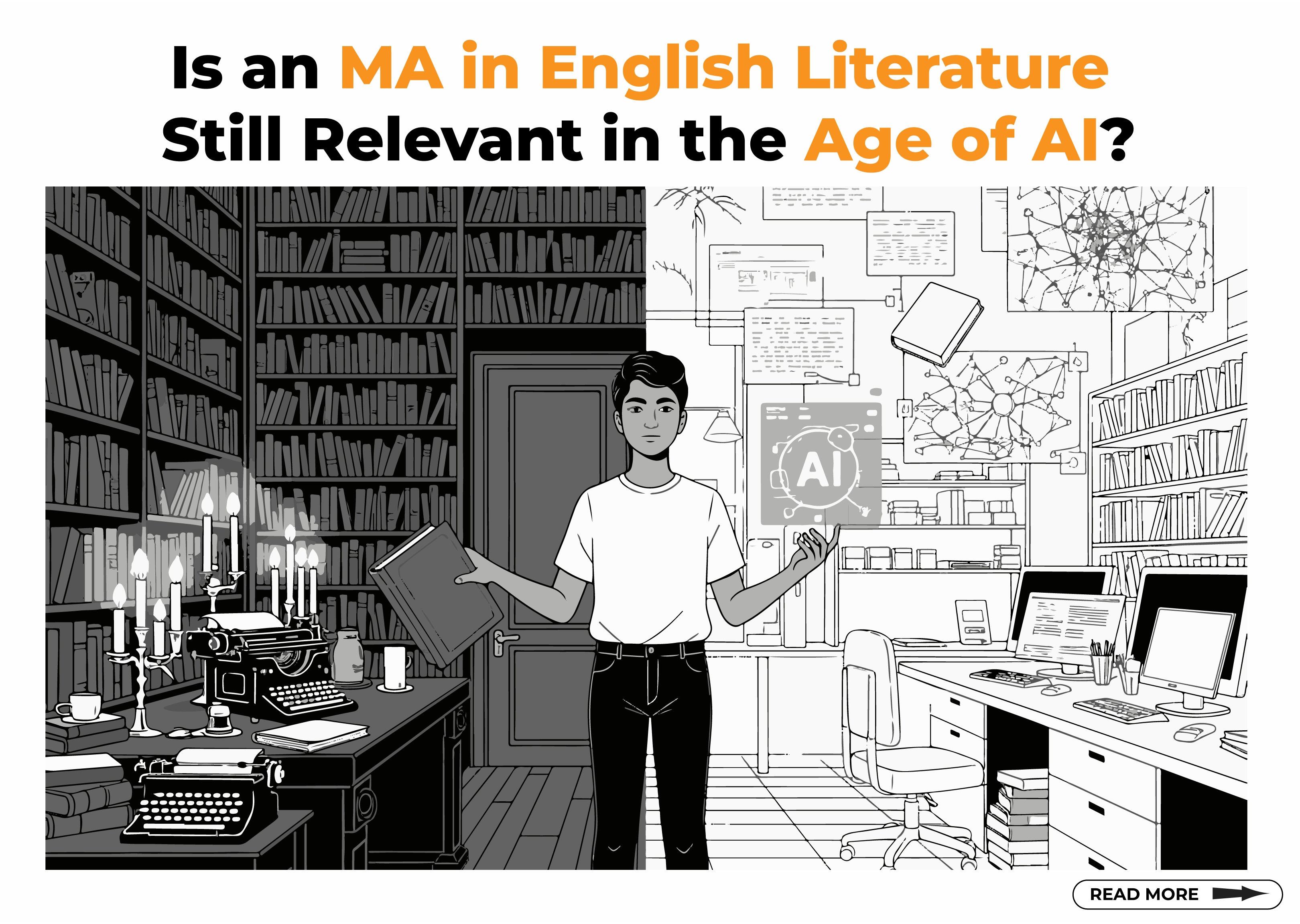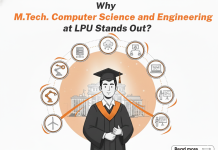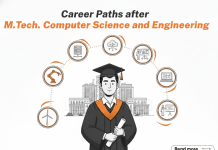Artificial Intelligence is transforming how industries operate. Machines now write code, generate text, and make data-driven decisions. In such a world, many wonder, does a degree like MA English Literature still matter?
When machines create content and handle routine communication, the human ability to understand culture, story, and symbolism becomes even more important. The question is not whether a Master of Arts in English is outdated, but whether it is the key to understanding the very systems we build.
At Lovely Professional University, we’re offering students a degree that empowers them to explore identity, culture, and ethics through the lens of literature.
In this blog, we explore the value of an English literature degree in today’s fast-paced, tech-heavy world. You’ll see how an English degree can still drive innovation, empathy, and leadership across industries.
Is Literature Losing Its Place in a Data-Driven World?
Data science, programming, and AI are ruling the job market. Degrees in the humanities are often labelled as less practical. But this perception misses the bigger picture.
An MA English Literature doesn’t just train you to read books. It sharpens your ability to think critically, argue clearly, and analyse culture. These skills are valuable, sometimes even more so than technical skills in industries that deal with people, products, and communication.
Literature explores themes like ethics, identity, justice, and society. These are issues that algorithms alone cannot solve. For example, AI systems often reflect human bias. Only someone trained in ethics and critical thought can address that.
The field of literature and AI is also growing fast. Experts are now using literary insights to examine how AI can reflect or reinforce bias in society. This means that the relevance of the humanities in the modern world has never been more crucial.
In short, literature teaches us how to ask the right questions. In a data-driven world full of automated answers, that’s a rare and essential skill.
How Are Literature Graduates Thriving in the Age of AI?
AI is not replacing literature graduates. It’s creating new opportunities for them.
Storytelling has become essential in technology. Whether it’s crafting chatbot scripts, building user journeys, or designing video games, the human touch matters. That’s where literature students excel.
Jobs now exist at the intersection of the humanities and tech. Think narrative design in gaming, UX writing in app development, or empathy modelling in AI tools. These roles require imagination, structure, and emotional intelligence, all taught in a Master of Arts in English Literature.
English graduates also find work in branding, strategy, digital marketing, and journalism. They help shape how companies communicate and how audiences respond. Many of these roles are full time, dynamic, and deeply creative.
Real-world examples include English grads working as content designers in fintech, campaign strategists in global NGOs, and innovation consultants in multinational firms. These are not just creative roles but also strategic ones. They problem solve. They build meaningful connections between brands and audiences.
Why Employers Are Still Hiring Humanities Thinkers?
Employers are no longer just hiring technical experts. They are hiring problem-solvers who understand people, cultures, and systems.
This is where literature graduates come in. They know how to understand complex situations, find patterns in human behaviour, and communicate solutions. A master’s degree in English helps students build these essential skills.
Top employers across industries need:
- Critical thinkers who can analyse global issues.
- Creative writers who can shape digital content.
- Cultural analysts who understand diversity and global markets.
- Communication experts who manage corporate voice and customer engagement.
These are not optional roles. They’re central to business strategy, public relations, content creation, and leadership.
At LPU, the MA English Literature programme helps students prepare for this demand. The course is designed to teach both traditional literary analysis and modern media skills. That makes graduates highly relevant and employable.
Humanities degrees like English literature are becoming vital in fields where understanding human behaviour, ethics, and emotion is key.
Is the MA in English Literature Evolving with the Times?
Absolutely. This is not the same degree as it was twenty years ago.
Today, English literature and digital media are deeply connected. Students no longer study only classic texts. They now explore film, television, online writing, memes, social media, and visual storytelling.
Topics such as digital ethics, post-truth politics, fake news, and identity in the internet age are common in modern curricula. These subjects reflect real-world concerns, and literature gives students the tools to tackle them.
LPU’s Master of Arts in English integrates interdisciplinary research, practical workshops, and industry projects. Students don’t just learn theory, they apply it.
They engage with modern tools like content management systems, digital libraries, and multimedia analysis. This makes the programme both rigorous and relevant. Graduates are ready for careers that require both intellectual depth and technical understanding.
This forward-thinking approach allows us to encourage students to explore new fields while grounding their skills in traditional literary excellence.
What Kind of Career Trajectories Does It Unlock?
Many students wonder what comes next after completing an MA English Literature. The answer: a wide range of exciting career opportunities.
Some of the most common sectors include:
- Journalism and Media: Write for newspapers, magazines, digital platforms, or work as editors and researchers.
- Corporate Communications: Craft messaging strategies for brands, write press releases, and manage internal communication.
- Policy and Public Affairs: Work with think tanks, NGOs, or government bodies. Help shape public opinion and draft reports.
- UX Writing and Content Design: Use your literary skills to guide user experience in apps, websites, and digital tools.
- Education and Academia: Teach at schools, colleges, or universities. Conduct research and contribute to curriculum development.
- Design Thinking and Innovation Strategy: Use empathy and storytelling to design human-centred solutions in tech and service industries.
Another exciting pathway is becoming a literary critic. These professionals write for journals, websites, or media outlets, offering deep insights into contemporary books, films, and cultural trends.
The diversity of careers after English literature shows how adaptable and valuable this degree is. The skills you gain are transferable, resilient, and timeless.
Is It Future-Proof? How Humanities Skills Are Age-Resilient?
Technology will keep evolving. But our need for empathy, ethics, and insight will only grow stronger.
The future of the humanities lies in their ability to help us stay human. While machines process data, we must still make sense of it. That’s where literature graduates lead the way.
They can write, influence, critique, and guide. They bring historical knowledge, ethical frameworks, and social awareness into boardrooms and digital spaces.
And that’s exactly what the world needs right now.
As AI handles tasks, humans will handle relationships. And that’s something literature teaches best.
Conclusion
So, is an MA in English Literature still relevant in the age of AI? Absolutely.
If you are someone who believes in the power of storytelling, in the need for ethical thinking, and in building connections across cultures, then this degree is not just relevant, it’s essential.
A Master of Arts in English isn’t just about books. It’s about understanding people. In a world full of fast change and smart machines, that understanding is priceless.
At Lovely Professional University, our focus goes beyond employment we shape adaptable, forward-thinking individuals. Our MA English Literature programme equips learners with the skills, confidence, and clarity to thrive in this evolving world.



![Career Paths after B.Sc. Information Technology [Lateral Entry] Career Paths after B.Sc. Information Technology](https://www.lpu.in/blog/wp-content/uploads/2025/12/Career-Paths-after-B.Sc_.-Information-Technology-218x150.jpeg)










